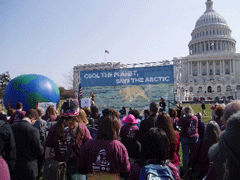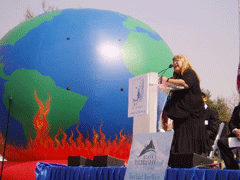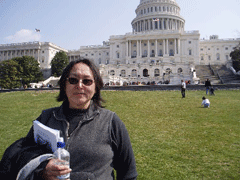Capitol Climate Round-up
Air Date: Week of March 23, 2007

Climate Crisis Action Day on the Capitol lawn. (Courtesy of Jeff Young)
Al Gore's global warming road show hits Congress. Living on Earth's Jeff Young tells us about the visit and the frenzy of climate change activity at the Capitol.
Transcript
GELLERMAN: From the Jennifer and Ted Stanley Studios in Somerville, Massachusetts - this is Living on Earth. I’m Bruce Gellerman. The last time former Vice President Al Gore was on the floor of the U.S. Senate was more than six years ago when he was certifying the Electoral College vote that denied him the presidency. Since then, Gore has become the de facto leader of a new campaign that he says is bigger than politics—the fight against global warming. His film about the subject “An Inconvenient Truth” won Gore an Academy Award. And this week, his impassioned message about climate change won him an audience with the U.S. Congress. Living on Earth’s Jeff Young had a front row seat.
YOUNG: Fresh from the red carpets of the Oscars, Al Gore returned to the marble halls of Congress where he served as a representative and senator for 16 years. Despite his academy award, Gore told his former congressional colleagues he didn’t want star treatment.
GORE: Rin Tin Tin was a movie star. I just have a slide show.
[LAUGHTER]
YOUNG: In a packed hearing room Gore lectured on the scientific evidence for what he calls a planetary emergency of climate change. Then he asked lawmakers to consider what future generations will think of them.
GORE: Either they will ask: “What in God’s name were they doing? Didn’t they see the evidence? Did they think all the scientists were wrong? What were they thinking?” Or they’ll ask another question. They may look back and they’ll say, “How did they find the uncommon moral courage to rise above politics and do what some said was impossible?”
YOUNG: With that Gore challenged Congress to think big with a bold list of energy proposals: No new coal-fired power plants unless they can capture carbon emissions; an overhaul of the tax system to tax pollution instead of income. And perhaps the most ambitious idea: an immediate freeze on carbon emissions.

Climate Crisis Action Day on the Capitol lawn. (Courtesy of Jeff Young)
YOUNG: That’s far more aggressive than any proposal now before congress. No lawmakers embraced all those ideas but most agreed with Gore’s assessment of climate science and a need to act. The notable exceptions: the senior Republicans - Representative Joe Barton of Texas, and Senator James Inhofe of Oklahoma. Barton questioned whether there is any link between carbon dioxide emissions and rising temperatures.
BARTON: It appears that temperature appears to drive CO2 not vice versa. On this point Mr. Vice President you’re not just off a little, you’re totally wrong.
YOUNG: Gore responded that consensus on global warming was like the consensus on gravity. In the Senate, he faced sharper criticism from Inhofe, who questioned predictions about sea level rise and hurricanes. Inhofe chaired the environment committee when Republicans controlled the Senate, and frequently calls global warming a hoax. Inhofe wanted Gore to answer questions about his personal energy consumption but insisted that he answer with only a yes or a no.
GORE: We purchase wind energy and green energy that does not produce carbon dioxide.
INHOFE: (interrupting) Senator Gore.
GORE: If I can continue.
INHOFE: Well you can’t, sorry.
BOXER: If you can allow, you’ve asked the senator an important question He’s answering it.
YOUNG: That was California Democrat Barbara Boxer, the new chair of the senate environment committee. To make her point she dangled in Inhofe’s face that symbol of senatorial power, the gavel.
BOXER: You’re not making the rules, you used to when you did this. You don’t do this anymore. Elections have consequences.
[APPLAUSE AND LAUGHTER]
YOUNG: It was good political theater. But it raises questions about Boxer’s ability to pass meaningful climate legislation. Any bill will need strong bipartisan support to survive a Senate where Democrats have just a tiny majority. One key Republican took a step in that direction after hearing Gore speak: Virginia’s elder statesman John Warner.

Speakers from various tribal communities in Alaska took to the stage at Climate Crisis Action Day.(Courtesy of Jeff Young)
WARNER: You have thrown down a very tough challenge today to the Congress and I’m prepared to take some risks and fight with you and our chairman.
YOUNG: Gore’s testimony was just the tip of the melting iceberg of climate activity on the Hill. In the same week, electric utility CEO’s considered a cap on greenhouse gas emissions; major Wall Street firms spoke about the investments that might follow such a cap; and a panel investigated whether the White House suppressed the work of climate scientists. And just outside the Capitol there was more.
ACTIVIST: (on P.A. system) Is it our moral responsibility to stop global warming?!”
[CHEERS]
YOUNG: Hundreds of climate activists crowded the capitol lawn for what they called a climate crisis rally. Some came from as far as Alaska. Colleen Swan lives in the arctic town of Kivalina where the melting permafrost threatens her community with massive sinkholes and rapid erosion.

Colleen Swan, from the Alaskan village of Kivalina, has Permafrost beneath her town that's melting,- causing sinkholes and coastal erosion that threatens residents' homes and drinking water. (Courtesy of Jeff Young)
SWAN: Alaska is where it’s happening, not here in Washington DC not in their offices, it’s happening now. I’m hoping that they’re paying attention this time because they need to. It’s not a question of whether it’s going to happen or not, it is happening and they need to listen.
YOUNG: Swan says she’s hopeful Al Gore’s climate warning will be heard. But she also remembers that he called the very first congressional hearings on global warming. That was 26 years ago.
For Living on Earth I’m Jeff Young in Washington.
Links
"Understanding and Responding to Climate Change: Highlights of National Academies Reports"
Living on Earth wants to hear from you!
Living on Earth
62 Calef Highway, Suite 212
Lee, NH 03861
Telephone: 617-287-4121
E-mail: comments@loe.org
Newsletter [Click here]
Donate to Living on Earth!
Living on Earth is an independent media program and relies entirely on contributions from listeners and institutions supporting public service. Please donate now to preserve an independent environmental voice.
NewsletterLiving on Earth offers a weekly delivery of the show's rundown to your mailbox. Sign up for our newsletter today!
 Sailors For The Sea: Be the change you want to sea.
Sailors For The Sea: Be the change you want to sea.
 The Grantham Foundation for the Protection of the Environment: Committed to protecting and improving the health of the global environment.
The Grantham Foundation for the Protection of the Environment: Committed to protecting and improving the health of the global environment.
 Contribute to Living on Earth and receive, as our gift to you, an archival print of one of Mark Seth Lender's extraordinary wildlife photographs. Follow the link to see Mark's current collection of photographs.
Contribute to Living on Earth and receive, as our gift to you, an archival print of one of Mark Seth Lender's extraordinary wildlife photographs. Follow the link to see Mark's current collection of photographs.
 Buy a signed copy of Mark Seth Lender's book Smeagull the Seagull & support Living on Earth
Buy a signed copy of Mark Seth Lender's book Smeagull the Seagull & support Living on Earth

